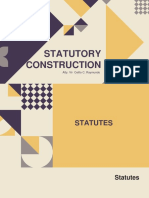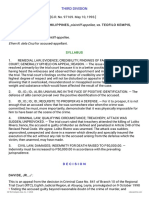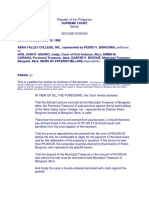StatCon Agpalo
StatCon Agpalo
Uploaded by
Jill BetiaCopyright:
Available Formats
StatCon Agpalo
StatCon Agpalo
Uploaded by
Jill BetiaCopyright
Available Formats
Share this document
Did you find this document useful?
Is this content inappropriate?
Copyright:
Available Formats
StatCon Agpalo
StatCon Agpalo
Uploaded by
Jill BetiaCopyright:
Available Formats
Statutory Construction (Agpalo)
CHAPTER 1: STATUTES Laws (jural and generic sense): whole body or system of law Laws (jural and concrete sense): rule of conduct formulated and made obligatory by legitimate power of the state Statutes: act of the legislature as an organized body, expressed in the form, and passed according to the procedure, required to constitute it as part of the law of the land. Public Statutes: affects the public at large or the whole community General Law: applies to the whole state and operates throughout the state alike upon all the people or all of the class; does not omit any subject or place naturally belonging to such class Special Law: relates to particular persons or things of a class or to a particular community, individual Local law: operation is confined to a specific place or locality Private Statutes: applies only to a specific person or subject * Substance rather than form Permanent Statutes: operation is not limited in duration but continues until repealed; does not terminate by the lapse of a fixed period Temporary Statutes: duration is for a limited period of time fixed or whose life ceases upon the happening of an event (emergency laws) Manner of referring to statutes: numbered and identified by the respective authorities than enacted them; serial number; referred by its title
Philippine Commission and the Philippine Legislature from 1901 to 1935 are
Legislative power of the Congress: Legislative power vested in the Congress of the Philippines (senate & House of Reps) EXCEPT to the extent reserved to the people y the provision on initiative and referendum Legislative Power: power to make, alter and repeal laws; the authority under the Constitution Constitution: will of the people in their original, sovereign and unlimited capacity House of Reps: more sensitive to local needs Senate: national perspective
Provisions of the Constitution: Non-self executing provisions: require congress to enact enabling legislations Self executing provisions: enact further laws to enforce the constitutional provisions within their confines, impose penalties for their violation, and supply minor details. BILL LAW Bill: proposed legislative measure introduced by a member/s of Congress for enactment into law. 1. First & second reading of bills a. FIRST READING st Secretary reports the bill for 1 rdg Rdg of # & title of the bill Referral to the appropriate committee May hold public rdgs b. SECOND READING Bill is read in full with the amendments proposed Copies are distributed Bill is subject to debates, motions and amendments Bill is voted 1. Approved bill is included rd in the calendar of bills for 3 rdg 2. Third reading a. Final vote for nays and yeas entered in the journal b. No amendment shall be allowed ** passed 3 readings on 3 separate days and printed copies in its final form have been distributed 3 days before its passage **except presidential certification (no judicial review) emergency, calamities 3. Conference committee reports rd a. Bill approved on 3 rdg transmitted to the other house for concurrence (agreement) w/c will follow the same route w/o amendment: transmitted to the president for appropriate action
Public Acts
Commonwealth Acts
Laws enacted during the Commonwealth from 1936 to 1946
Republic Acts
those under the 1987 Constitution
Batas Pambansa
Laws promulgated by Batasang Pambansa
Presidential Decree & Executive Orders
those issued by the President in the excercise of his legislative power
Statutory Construction (Agpalo)
w/ amendment: differences will be settled by the Conference Committee of both chambers, whose report or recommendation thereon will have to be approved by both Houses **Conference Committee: mechanism for compromising differences between the senate and the house in the passage of a bill into law; third body of the legislature 3 versions of the bill ** lower house ** Senate ** Conference Committee 4. Authentication of bills a. Lawmaking process ends when in the bill is approved by the body b. System of authentication devised is the signing of the speaker and the senate president of the printed copy of the approved bill 5. Presidents approval/veto a. Approves signs b. Veto return with his objections to the house where it originated 2/3 of all the members of each house voting separately c. President did not sign or communicate his veto to the house where it originated within 30 days upon receipt thereof PARTS OF STATUTES 1. Preamble prefatory statement or explanation or a findings of facts, reciting the purpose, reason or occasion for making the law; found after the enacting clause & before the body of the law 2. Title of the Statute every bill shall embrace only 1 subject w/c shall be expressed in the title; refrain from conglomeration of heterogeneous subjects
You might also like
- Statutory Construction ReviewerDocument26 pagesStatutory Construction ReviewerCharles Aames Bautista95% (42)
- Statutory Construction Agpalo PDFDocument70 pagesStatutory Construction Agpalo PDFYan Lean Dollison60% (5)
- Legislative Process in UgandaDocument8 pagesLegislative Process in UgandaThe Independent Magazine100% (2)
- 01 Stat Con Prelim NotesDocument6 pages01 Stat Con Prelim NotesMarc CosepNo ratings yet
- Reviewer - Agpalo NotesDocument81 pagesReviewer - Agpalo NotesKaye MendozaNo ratings yet
- Statutory Construction ReviewerDocument64 pagesStatutory Construction Reviewerkaylanganmoako100% (2)
- Year 8 Civics and Citizenship Test RevisionDocument30 pagesYear 8 Civics and Citizenship Test RevisionSimpliciusNo ratings yet
- Agpalo Notes For PrintDocument48 pagesAgpalo Notes For PrintMemings EvilshitNo ratings yet
- Statutory Construction AgpaloDocument232 pagesStatutory Construction AgpaloAlex M Tabuac100% (1)
- Statcon ReviewerDocument17 pagesStatcon ReviewerKTNo ratings yet
- Legal Method Final ExamDocument118 pagesLegal Method Final ExamGraceSantos0% (1)
- Agpalo Cases 2003Document84 pagesAgpalo Cases 2003Aldin Lucena AparecioNo ratings yet
- Chapter 1. Statutes: A. in GeneralDocument18 pagesChapter 1. Statutes: A. in GeneralMarco RamonNo ratings yet
- Stat Con RecitDocument141 pagesStat Con RecitJhon Allain HisolaNo ratings yet
- Agpalo Notes 2003Document79 pagesAgpalo Notes 2003Brian DuelaNo ratings yet
- Agpalo Notes 2003Document84 pagesAgpalo Notes 2003Darn Roque BustamanteNo ratings yet
- Stat Con Agpalo NotesDocument84 pagesStat Con Agpalo NotesJaycelenni PalerNo ratings yet
- Statutory Construction 2Document33 pagesStatutory Construction 2MingNo ratings yet
- Statutory Construction 1Document5 pagesStatutory Construction 1Gillian AlexisNo ratings yet
- ITL ReviewerDocument8 pagesITL ReviewerDanella Diane DimapilisNo ratings yet
- Agpalo Notes Chapters 1-5Document56 pagesAgpalo Notes Chapters 1-5pcruz_665001100% (3)
- StatconDocument94 pagesStatconAngeloReyesSoNo ratings yet
- Statutory Construction Reviewer - PrelimsDocument6 pagesStatutory Construction Reviewer - PrelimssarsifloatNo ratings yet
- BLOCK D Statcon ReviewerDocument29 pagesBLOCK D Statcon ReviewerMoncie SantosNo ratings yet
- Consti 1 LegislativeDocument169 pagesConsti 1 LegislativeAllyza RamirezNo ratings yet
- Parts of A StatuteDocument4 pagesParts of A StatuteLesterNo ratings yet
- Statutory ConstructionsDocument26 pagesStatutory ConstructionsRye SteveyNo ratings yet
- A Written Report in Political Science in Article VI: Legislative Department (Section 26 and 27)Document7 pagesA Written Report in Political Science in Article VI: Legislative Department (Section 26 and 27)Rohj EbreoNo ratings yet
- Chapter 5 Statcon 1Document12 pagesChapter 5 Statcon 1Gelo DiazNo ratings yet
- Lesson 6 HandoutDocument4 pagesLesson 6 Handoutmaryjoy.oreditoNo ratings yet
- Enactment of StatutesDocument9 pagesEnactment of StatutesMichyLGNo ratings yet
- Statutory Construction: Atty. Ramil F. de JesusDocument12 pagesStatutory Construction: Atty. Ramil F. de JesusRamil F. De JesusNo ratings yet
- Stat Con 2Document35 pagesStat Con 2Marc Cosep100% (1)
- Reviewer - Agpalo Chap 1Document14 pagesReviewer - Agpalo Chap 1ToniMoliNo ratings yet
- Statutory Construction: Preliminary ConsiderationsDocument5 pagesStatutory Construction: Preliminary ConsiderationsAbbyr NulNo ratings yet
- Legres Midterm NotesDocument13 pagesLegres Midterm NotesWater MelonNo ratings yet
- DocumentDocument5 pagesDocumentNorman jOyeNo ratings yet
- How Does A Bill Becomes A LawDocument4 pagesHow Does A Bill Becomes A LawJayson PanagaNo ratings yet
- Notes On "Statutory Construction by Ruben E. Agpalo, 2009 Edition" Outline by Charles Bautista, Arellano University School of LawDocument29 pagesNotes On "Statutory Construction by Ruben E. Agpalo, 2009 Edition" Outline by Charles Bautista, Arellano University School of LawSeventeen 17No ratings yet
- The US Constitution with the Declaration of Independence and the Articles of ConfedeFrom EverandThe US Constitution with the Declaration of Independence and the Articles of ConfedeRating: 4.5 out of 5 stars4.5/5 (236)
- The Constitution Of The United States Of America: the constitution of the united states pocket size: the constitutionFrom EverandThe Constitution Of The United States Of America: the constitution of the united states pocket size: the constitutionNo ratings yet
- The U.S. Constitution with The Declaration of Independence and The Articles of ConfederationFrom EverandThe U.S. Constitution with The Declaration of Independence and The Articles of ConfederationRating: 4.5 out of 5 stars4.5/5 (7)
- The United States Government: A book so the rest of us can understandFrom EverandThe United States Government: A book so the rest of us can understandNo ratings yet
- Address at Oregon Bar Association annual meetingFrom EverandAddress at Oregon Bar Association annual meetingNo ratings yet
- Constitution of the Commonwealth of the Northern Mariana IslandsFrom EverandConstitution of the Commonwealth of the Northern Mariana IslandsNo ratings yet
- Constitution of the Empire of Brazil — Constitution of 1824From EverandConstitution of the Empire of Brazil — Constitution of 1824No ratings yet
- Insiders Talk: Glossary of Legislative Concepts and Representative TermsFrom EverandInsiders Talk: Glossary of Legislative Concepts and Representative TermsNo ratings yet
- People v. HadjiDocument6 pagesPeople v. HadjiJill BetiaNo ratings yet
- League v. El Pueblo de FilipinasDocument4 pagesLeague v. El Pueblo de FilipinasJill BetiaNo ratings yet
- Civ Pro Flores 39Document8 pagesCiv Pro Flores 39Jill BetiaNo ratings yet
- Civ Pro Rapid City 14Document4 pagesCiv Pro Rapid City 14Jill BetiaNo ratings yet
- Civ Pro Palma 14Document8 pagesCiv Pro Palma 14Jill BetiaNo ratings yet
- Jarque v. Smith Bell Co. Ltd.Document4 pagesJarque v. Smith Bell Co. Ltd.Jill BetiaNo ratings yet
- People v. Plasencia y DesamparadoDocument10 pagesPeople v. Plasencia y DesamparadoJill BetiaNo ratings yet
- People v. BisdaDocument33 pagesPeople v. BisdaJill BetiaNo ratings yet
- NLRC Rules of Procedure 2011Document30 pagesNLRC Rules of Procedure 2011Jill BetiaNo ratings yet
- People v. KempisDocument13 pagesPeople v. KempisJill BetiaNo ratings yet
- Civ Pro Citizens Surety 14Document4 pagesCiv Pro Citizens Surety 14Jill BetiaNo ratings yet
- People v. PerezDocument13 pagesPeople v. PerezJill BetiaNo ratings yet
- People v. de Guzman y SicoDocument13 pagesPeople v. de Guzman y SicoJill BetiaNo ratings yet
- A Wef7™r '"F: Republik A NG PilipinasDocument6 pagesA Wef7™r '"F: Republik A NG PilipinasJill BetiaNo ratings yet
- Luego Vs CSCDocument2 pagesLuego Vs CSCJill BetiaNo ratings yet
- CASE No. 5 Masipequina vs. CAsdfDocument1 pageCASE No. 5 Masipequina vs. CAsdfJill BetiaNo ratings yet
- G.R. No. L-57062 Mariategui Vs CA January 24, 1992Document4 pagesG.R. No. L-57062 Mariategui Vs CA January 24, 1992Jill BetiaNo ratings yet
- Ao No 12 Series of 2011 - CDCLAADocument46 pagesAo No 12 Series of 2011 - CDCLAAJill Betia75% (4)
- Agan Vs Piatco GR 155001 May 5, 2003Document21 pagesAgan Vs Piatco GR 155001 May 5, 2003Jill BetiaNo ratings yet
- R.A 1161 SSS LawDocument16 pagesR.A 1161 SSS LawJill BetiaNo ratings yet
- 1.0 General Principles of TaxationDocument71 pages1.0 General Principles of Taxationbrendonfaustino024No ratings yet
- Rizal ReviewDocument26 pagesRizal Revieweduard pradoNo ratings yet
- 01 Rizal LawDocument3 pages01 Rizal LawJohn Ernest PlatilNo ratings yet
- 7 Functions of The Legislative BranchDocument17 pages7 Functions of The Legislative BranchJerry De Leon LptNo ratings yet
- Statutory Construction NotesDocument18 pagesStatutory Construction NotesKhryz CallëjaNo ratings yet
- Nevada Legislative ProcessDocument20 pagesNevada Legislative ProcessBen MargiottNo ratings yet
- Constitutional Law 1 ReviewerDocument29 pagesConstitutional Law 1 RevieweracadaccmemeNo ratings yet
- Act ProceedingsDocument1 pageAct ProceedingsShakil Safin OrthoNo ratings yet
- NAS Questions and Answers PDFDocument52 pagesNAS Questions and Answers PDFDaniel MunasheNo ratings yet
- PPG Performance TaskDocument6 pagesPPG Performance TaskRennel HernandezNo ratings yet
- What Is Legislative DepartmentDocument12 pagesWhat Is Legislative DepartmentJc DangilanNo ratings yet
- Text Guide UK Legislative ProcessDocument2 pagesText Guide UK Legislative ProcesszubairNo ratings yet
- Malaysian Legal SystemDocument34 pagesMalaysian Legal SystemSyi SyaNo ratings yet
- Grade 9 Social Studies Notes (Government of Jamaica)Document17 pagesGrade 9 Social Studies Notes (Government of Jamaica)api-247871582100% (2)
- POS 001 Students Day 25Document7 pagesPOS 001 Students Day 25Kyle Albert GullodNo ratings yet
- 100 MCQs - Interpretation of StatutesDocument27 pages100 MCQs - Interpretation of StatutesManvendra SinghNo ratings yet
- Admin Case Digests 3 25 2019Document29 pagesAdmin Case Digests 3 25 2019Tess LimNo ratings yet
- Coi Unit 3Document19 pagesCoi Unit 3Anmol RatnaNo ratings yet
- G.R. No. 133064 - Miranda v. Aguirre - Sept. 16, 1999Document18 pagesG.R. No. 133064 - Miranda v. Aguirre - Sept. 16, 1999Raphael Antonio PunzalanNo ratings yet
- D581A213-C90C-4F62-8EF5-C37C8BABA31F (1)Document48 pagesD581A213-C90C-4F62-8EF5-C37C8BABA31F (1)Vedansha SinghalNo ratings yet
- Ppg-Module 7 PDFDocument16 pagesPpg-Module 7 PDFNoemi Ruth Carrasco MesanaNo ratings yet
- Abakada Vs ErmitaDocument2 pagesAbakada Vs ErmitaCarlota Nicolas VillaromanNo ratings yet
- Understanding The Rizal LawDocument1 pageUnderstanding The Rizal LawFuraida TikingNo ratings yet
- The Legislative Branch of The Philippine GovernmentDocument38 pagesThe Legislative Branch of The Philippine GovernmentPatricia Angela Labrado100% (3)
- When Is It Construction and When Is It Judicial Legislation?Document22 pagesWhen Is It Construction and When Is It Judicial Legislation?Hanna PentiñoNo ratings yet
- LESSON 8 - LEGISLATION AND THE RULE OF LAW Reported by Aira&NiljohnDocument54 pagesLESSON 8 - LEGISLATION AND THE RULE OF LAW Reported by Aira&NiljohnNilJohn V. MoyanoNo ratings yet
- Of The Defunct Court of First Instance of AbraDocument68 pagesOf The Defunct Court of First Instance of AbraKim Boyles FuentesNo ratings yet













































































































